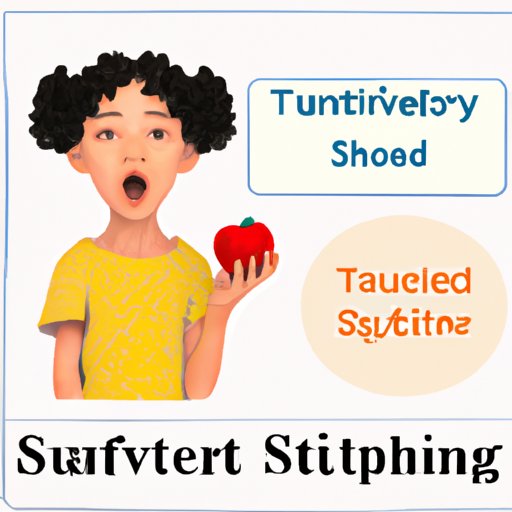
I. Introduction
Stuttering affects millions of people worldwide, making it difficult for them to express themselves fluently and confidently. It can significantly impact one’s social life, career, and overall quality of life. The good news is that stuttering is a treatable condition, and there are several strategies and therapies that individuals can use to overcome it.
The purpose of this article is to explore some of the most effective ways to stop stuttering. From the latest research-based therapies to personal accounts, mindfulness techniques, nutrition, and technology-based therapy, we’ll cover a range of practical solutions to help you become more confident and fluent in your speech.
II. Research-Based Approach
If you’re struggling with stuttering, several therapies can help you improve your speech. Speech therapy, fluency shaping, and cognitive-behavioral therapy are some of the most commonly used approaches.
Speech therapy involves working with a speech-language pathologist who can help you learn new speaking techniques, reduce anxiety, and improve your self-esteem. Fluency shaping, on the other hand, focuses on modifying your speech motor patterns, such as breathing and articulation, to help you speak more smoothly. Cognitive-behavioral therapy aims to address the psychological and emotional factors that can contribute to stuttering by teaching individuals coping skills and positive self-talk.
While the effectiveness of these therapies varies from person to person, several studies have shown that they can significantly improve stuttering symptoms and enhance overall communication skills.
III. Personal Account
One of the most inspiring ways to learn about overcoming stuttering is through personal stories. Let’s hear from someone who has battled stuttering and won.
Jason was a young adult who had been stuttering since he was a child. Despite his stutter, he was determined to pursue a career in public speaking. He knew it would be challenging, but he didn’t let that stop him from chasing his dreams.
Jason credits his success to his mindset, practice routine, and support system. He learned to adopt a growth mindset and focus on his progress rather than perfection. He also developed a daily practice routine that included meditation, visualization, and public speaking exercises. Finally, he surrounded himself with people who believed in him and encouraged him along the way.
IV. Mindfulness Techniques
Mindfulness techniques such as meditation, yoga, and deep breathing can be powerful tools to help individuals manage stuttering and become more confident public speakers. Research has shown that mindfulness practices can impact the brain’s neural pathways, positively affecting speech production and regulating one’s emotional state.
Meditation can help individuals become more aware of their thoughts and feelings, reducing anxiety and promoting relaxation. Yoga helps improve breathing patterns, increase self-awareness, and build strength and flexibility. Deep breathing exercises, such as diaphragmatic breathing, can help individuals control breathing patterns, reduce stuttering symptoms, and improve overall speech quality.
V. Nutrition and Stuttering
What you eat can impact your stuttering symptoms. While there’s no specific diet that can eliminate stuttering, some foods can trigger or worsen it. Foods that produce excessive mucus, such as dairy products and sugar, can lead to vocal strain and increase stuttering. Caffeine and alcohol, which can affect the central nervous system, can also cause changes in speech patterns and trigger anxiety.
On the other hand, eating a balanced diet rich in vitamins, minerals, and antioxidants can support optimal brain function, enhance overall health, and contribute to better speech production. Foods high in omega-3 fatty acids, such as fish and nuts, can support brain health and improve mood. Whole grains, fruits, and vegetables are excellent sources of fiber, vitamins, and minerals, which can boost your energy levels and enhance your cognitive abilities.
VI. Technology-Based Therapy
Technology-based tools and apps can be excellent resources for individuals working to improve their speech. Digital speech therapy and voice recognition software can simulate real-world speaking situations, provide feedback, and track progress. They can also offer personalized exercises and techniques based on individuals’ specific needs and goals.
One example of a technology-based therapy is “SpeechEasy,” a device that uses altered auditory feedback to help people speak more fluently. Another example is the “Fluency Master,” a device that teaches individuals to control their airflow and pressure while speaking, improving fluency and reducing stuttering.
VII. Childhood Stuttering
Stuttering can be especially challenging for children, impacting their social and emotional development. The causes are not fully understood, but it is thought to be a combination of genetic, developmental, and environmental factors.
If you’re a parent or teacher of a child who stutters, there are several tips that can help you support them. Encourage positive communication behaviors, such as active listening and turn-taking, offer comfort and reassurance, and focus on the child’s strengths and abilities. Several resources and organizations are available to support families affected by stuttering.
VIII. Conclusion
Stuttering can be a challenging condition to live with, but it is treatable. From research-based therapies to personal accounts, mindfulness techniques, nutrition, and technology-based therapy, we’ve covered a range of practical solutions to help you overcome stuttering and become more confident in your speech.
Remember that the journey to overcoming stuttering may not be easy, but with the right mindset, support, and tools, it’s possible. Take time to explore what works best for you, and don’t hesitate to seek help from a speech-language pathologist or other professionals.





